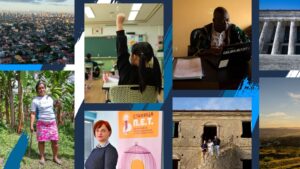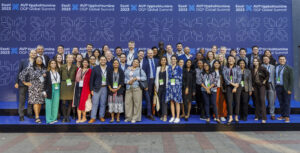Saying Goodbye to OGP
After 11 years I will shortly be standing down as Deputy CEO of the Open Government PartnershipThe Open Government Partnership (OGP) is a multi-stakeholder initiative focused on improving government transparency, ensuring opportunities for citizen participation in public matters, and strengthen... More. I am a candidate in the UK General Election on July 4th, and hope to continue being a champion for transparencyAccording to OGP’s Articles of Governance, transparency occurs when “government-held information (including on activities and decisions) is open, comprehensive, timely, freely available to the pub... More, accountability, and more inclusive democracy if I am elected.
A few weeks ago I had the opportunity to speak to all our brilliant OGP staff. Below is an edited version of the goodbye speech. I have loved working with the brilliant, brave and innovative open government community all around the world.
I will miss you all, but this is only a goodbye to our shared organisation – OGP – and not to our mission.
– Joe Powell
Farewell OGP Speech
It’s been the privilege of my life to have spent the last 11 years working at the Open Government Partnership. When I joined, our tiny three person team was setting up a new organization, and I am leaving absolutely convinced that OGP has an even more important role to play today.
The reason for that is the relevanceAccording to the OGP Articles of Governance, OGP commitments should include a clear open government lens. Specifically, they should advance at least one of the OGP values: transparency, citizen partic... of our vision, the strength of our track record and the huge shift in global democratic politics in the past decade.
When OGP was founded in 2011 it was an excellent idea: reformers in government and civil society working together as part of a new form of nimble global partnership that instead of being bogged down by treaties and foreign policy bureaucracy, would focus on the actual reforms that make government more effective, accountable and give citizens a voice at and beyond electionsImproving transparency in elections and maintaining the independence of electoral commissions is vital for promoting trust in the electoral system, preventing electoral fraud, and upholding the democr... More.
I believe in that vision today as much as when I joined OGP.
I also believe that our design choices have stood the test of time.
We took an early strategic decision that we would not be a partnership of perfect democracies – not that such a thing ever existed! – but a partnership where our imperfections would be shared and no one had a monopoly on good ideas.
Now I will concede that has led to some uncomfortable moments.
Not every OGP government has always practiced what they preach, and particularly in the last few years it has often felt like the battle for democratic values has become more intense.
But I will mainly remember those moments when OGP came alive.
Being part of the first meetings between Tunisian officials and civil society after the fall of a decades long dictator, and our point of contact scratching off Ben Ali’s name from his embroidered suitcase as he was now finally free of him.
Negotiating behind the scenes to secure the first ever commitmentOGP commitments are promises for reform co-created by governments and civil society and submitted as part of an action plan. Commitments typically include a description of the problem, concrete action... to a public beneficial ownershipDisclosing beneficial owners — those who ultimately control or profit from a business — is essential for combating corruption, stemming illicit financial flows, and fighting tax evasion. Technical... More registry at the UK OGP Summit in 2013 – something we now push for around the world to combat money laundering.
Organising our Obama UN event, when heads of state were beating down the door to get in and speak.
Or seeing the difference open government initiatives had made to communities across the world.
I’ve been fortunate to visit 38 of our countries over the years and it is seeing the difference open government can make to citizens that has been the absolute highlight.
But I mainly want to focus on how we ensure the continued success of OGP in the future.
The context now for open government is clearly more challenging than when we started.
The rise of illiberal democracy and authoritarian models of government looks different in each country that has experienced it, but it is clear there are some common patterns.
The authoritarian playbook includes attacks on civil society, capture of state resources, undermining freedom of the press and erosion of an independent justiceTo address barriers that prevent citizens from having their justice needs met, OGP participating governments are working to expand transparency, accountability, and inclusion into all systems of justi... system.
These leaders draw their strength from dividing their populations, using ideology, culture wars and religion to cement their base – and technology to polarize people further.
They thrive on apathy, a low trust environment and a belief that nothing can change – something I have seen from knocking on thousands of doors in the past 18 months in London for my own election.
To counter this we need to avoid three common excuses:
First, that is the voters’ fault for electing populist leaders.
Second, that it is all the fault of foreign powers for orchestrating disinformation, promoting corruption, and stoking division – however true that may be.
Third, that returning to the “good old days” – or promoting a simplistic democracies vs authoritarians showdown – will answer the very real concerns that citizens have.
Instead we need to address why democracy is not delivering, and be part of the answer to making it better.
I believe OGP has many of the ingredients of what a better version of democracy looks like:
- Improving public services by empowering citizens to have a say, and ensuring more accountability to local communities.
- Tackling vested interests who dominate political processes by opening up money in politics and ensuring citizens are able to be heard.
- Advancing environmental justice by exposing the agenda of polluters and subjecting developers to fair scrutiny.
- Bringing digital governanceAs evolving technologies present new opportunities for governments and citizens to advance openness and accountability, OGP participating governments are working to create policies that deal with the ... More under democratic control – including AI accountability, tech platform regulationGovernment reformers are developing regulations that enshrine values of transparency, participation, and accountability in government practices. Technical specifications: Act of creating or reforming ... while also harnessing the potential of technology-enabled feedback to government.
- Reducing corruption that drives inequality and erodes the taxPlacing transparency, accountability, and participation at the center of tax policy can ensure that burdens are distributed equitably across society. Technical specifications: Commitments related to c... base.
- Building trust in politics through dialogue and accountability, and including voices in decisions that are traditionally ignored.
These approaches amount to a radical update to traditional liberal democracy – but they have not formed a coherent political agenda, informed by what reforms are working in different countries facing common populist challenges.
We need a much clearer vision of what a better version of democracy looks like and how to achieve it, starting with what democracies themselves can control.
This is where OGP comes in.
This week will be all about the crucial decisions this team will make on where to focus our efforts, which is hugely important.
But just as critical is how we go about our work.
So my leaving plea to our community is to always keep in mind – the politics, the partnership, and the people.
What do I mean by each of those?
First, we are an inherently political community and organisation.
We don’t take party political sides, but we are part of the political ecosystem. The issues we work on are for the most part political, not technical, challenges.
OGP will lose its magic if we drift into becoming a technocratic open government promotion organisation, or a classic multilateral body. That field is crowded enough as it is.
Our huge value is to be at the centre – between government and civil society, between international, national and local priorities, between expert partners and demand for support.
That doesn’t mean we only mediate – far from it – but we see the incentives from all sides in a way no one else can, and we figure out how to make progress – however slow and painful it can be – towards changing the culture of government towards openness.
The reason I am standing for elected office is because I have seen in my own country how damaging it can be to open government and democracy when the politics goes wrong – from the trashing of standards and integrity in public life, to cronyism and corruption in procurement, dirty money in luxury property and lobbyingLobbying transparency allows the public to ensure that there is diversity of participation and contribution to public decision-making. Technical specifications: Policies and actions affecting lobbying... scandals – and the billions of pounds wasted that could be spent on public services that are crumbling.
I hope I can be a small part of helping fix those problems if I make it to parliament, but it will take a broad coalition of people in government, civil society, civil servants, local officials – in short the very type of coalitions that have congregated around OGP.
So we should embrace the messiness that often comes in politics, not run away from it, and be the people on the end of the phone when reformers need help getting things done.
Second, I believe our biggest strength is our partnership.
We are only as strong as the community we work with, and that means we have a responsibility to them.
I know recently it has felt like we’ve been through a lot of change – a new strategy, restructuring, the pandemic driven issues with finances – but that is now behind us. I believe we are now in a great position organisationally – and our goal must be to focus resolutely on how we achieve our external goals together.
I know it can be tempting to focus on what you can best control, but that is the road to irrelevance when working on open government.
So I would encourage everyone to be thinking about how we communicate our work to the wider world, how we find new partners, how we nourish the ones we have and to always remember that every single one of the OGP’s biggest achievements have been done with our community, not by us acting alone.
Finally, our people.
I can say hands down this is the best team I have ever worked in.
From all of you here, to all the people who came before you, I have learned so much from working with some of the most talented people on this planet.
I’ve always felt like it is a privilege to get up in the morning and work for OGP because we focus on some of the biggest challenges facing the world today – and we do have a really serious job to do – but it has also been a privilege because of our team’s humility, dedication and sense of fun.
I will never forget those moments of high stress in the back rooms of government offices in Tallinn, Paris and Tbilisi seeing the skill, patience and resilience of our team and our community pulling together to solve problems – always seeing the bigger picture, and staying calm and focused… for the most part.
But when the chips are down it is the OGP team you want on your side.
Etched on my brain forever will be 4.39pm, August 30th 2021.
That is the local time in Mazar-i-Sharif when 152 Afghan civil society activists, journalists, civil servants and others took off in a plane chartered by us at OGP to safety, just days before the US relinquished the air space to the Taliban. I will always be incredibly proud of everyone who helped in that moment, and in awe of the families now building new lives overseas after such a traumatic event.
So never doubt what you can achieve at OGP – there are many more chapters to be written, and I look forward to championing you all from the other side.
Comments (1)
Leave a Reply
Related Content

The Open Gov Challenge
Join hundreds of reformers around the world - in government and civil society - who are working to make their communities stronger, more open, participatory, inclusive, and accountable.

OGP’s 2023-2028 Strategy
OGP’s 2023-2028 strategy is now available. With over 1,000 contributions, the open government community helped to identify emerging strategic directions.

Open Gov Guide
The Open Gov Guide is the go-to resource for officials, civil society representatives, and other actors looking for recommendations, examples, and resources on open government.


NASEER KAMAL Reply
Thank you so much for your dedication and passion, Joe. Your leadership and vision have been played tremendous role in the OGP.
I wish you all the best in your future endeavours, including your candidacy in the UK general Election.
My you continued championing of transparency, accountability, and inclusive democracy lead to even greater successes.
Your inspired speech encourage us to continue struggle for a better version of democracy, and motivate us to work more for the strengthen democratic institutes and support them who are working with the people and for the people.
Thank you for all your guidance, support and inspiration, Joe.